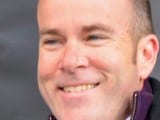Coming Clean –
By Michael Brune –
Everyone has an occasional bad day at work, but it’s tough to top the one that Rep. Eric Cantor had last month in Virginia.
Overnight, he went from being one of the most powerful figures in Congress to a trivia question: Name the first House majority leader in history to lose a primary.
What made the election upset all the more stunning is that it didn’t even appear to be a fair fight. Besides being an incumbent, Cantor outspent his Tea Party opponent, college professor Dave Brat, 26 to 1. Brat spent less than $200,000. His 23-year-old campaign manager only graduated from college last year.
What the heck happened?
A lot of words have been put together to explain Cantor’s defeat, but his loss should remind us of something that’s easily forgotten in an era of Super PACs and billionaire donor networks: Real passion and commitment can’t be bought.
And despite the relatively recent influx of huge amounts of money into our electoral process, passion and commitment (which Brat’s Tea Party supporters had in spades) can still win against any odds.
To my thinking, that’s good news for the Sierra Club and our allies as we prepare for what looks to be an epic fight over our nation’s energy future. At their latest top-secret summit, the billionaire Koch
brothers set a goal of raising almost $300 million just this year to roll back progress on clean energy and fighting climate disruption.
That might seem like a lot of money. OK, it _IS_ a lot of money, but it represents only 0.3 percent of the combined net worth of the Kochs. We are up against some deep, deep pockets.
They’re not deep enough to stop us, though. Not if we harness the righteous people power of millions of Americans who aren’t willing to stand by while our planet is destroyed.
Many of the Sierra Club’s most important campaigns, whether it’s protecting special places or replacing dirty fossil fuels with clean, renewable energy, have been fought and won at the local, grassroots level. That’s not going to change, either.
Of course, that doesn’t mean we won’t use new tools for grassroots activism — the Internet and the rise of social media can’t be ignored. But the basic principles of organizing people at the local level and winning against much bigger and better-funded opponents are timeless. So, if you’re interested in helping us keep winning, I suggest you start by doing three things.
First, if you haven’t already, connect with your local Sierra Club chapter. That’s where you can find other people right now who want to make a better world. Chances are, they’ve got at least one local
campaign that could use your help.
Second, get some tips and take some inspiration from folks who have already done this stuff successfully. I’m going to suggest three places to get you started, but a rich and diverse literature of
grassroots wisdom is out there waiting to be tapped.
Closing the Cloud Factories: Lessons From the Fight to Shut Down Chicago’s Coal Plants, by Kari Lydersen, tells the full story of how Chicago’s Little Village neighborhood fought a long and
ultimately successful campaign to retire the Fisk and Crawford coal plants. It’s a free ebook you can read on your laptop or tablet. The people of Little Village didn’t have a lot of political influence, much less money, but thanks to organizers like Kim Wasserman (herself a mom), they never gave up on
stopping the air pollution that was making so many of their kids sick.
For a concise and practical overview of what it takes to run a grassroots environmental campaign, you can’t beat “Fight & Win” by Brock Evans, who has decades of experience under his belt working on environmental campaigns for the Sierra Club, the Audubon Society, and others. His “manual for the new
eco-warrior” combines both practical advice (“listen hard,” “get people over to your place”) and killer stories, including the time five people in Camden, NJ, managed to save “two million acres of a beautiful place in Alaska they’d never seen” by answering their phones.
This is a book I wish I’d had 20 years ago when I started out as an environmental organizer.
And because this is a multigenerational effort, I want to give a shout-out to a book I can’t wait to read and give to my kids: Josie and the Fourth Grade Bike Brigade, by Antonia Bruno and her parents, Kenny Bruno and Beth Handman.
I read an advanced copy of this book, and it’s awesome! Josie and her pals prove that you’re never too young to do something about climate change, and show that it’s possible to be a do-gooder and have fun, too. If you know any potential elementary school climate activists, they’ll be both entertained and inspired by Josie’s adventures.
And my final suggestion is a bit of a tease: Watch this space.
The Sierra Club is cooking up some new approaches to digital environmental activism that you’ll hear more about later this summer. I think you’ll love it. We’re going to give regular people even greater access to the power they already have — power that can change the world. That’s a kind of power the Kochs and their pals will never know — because it’s not for sale.















